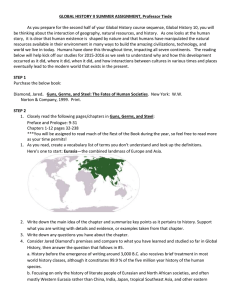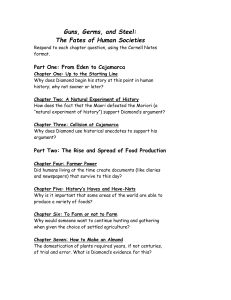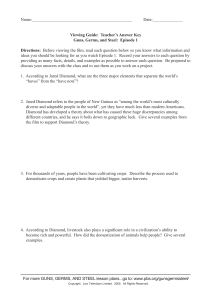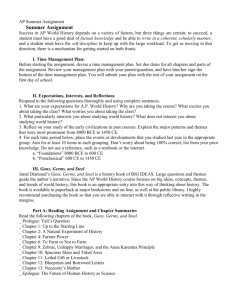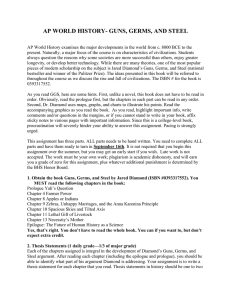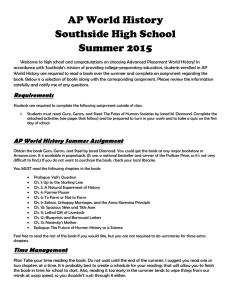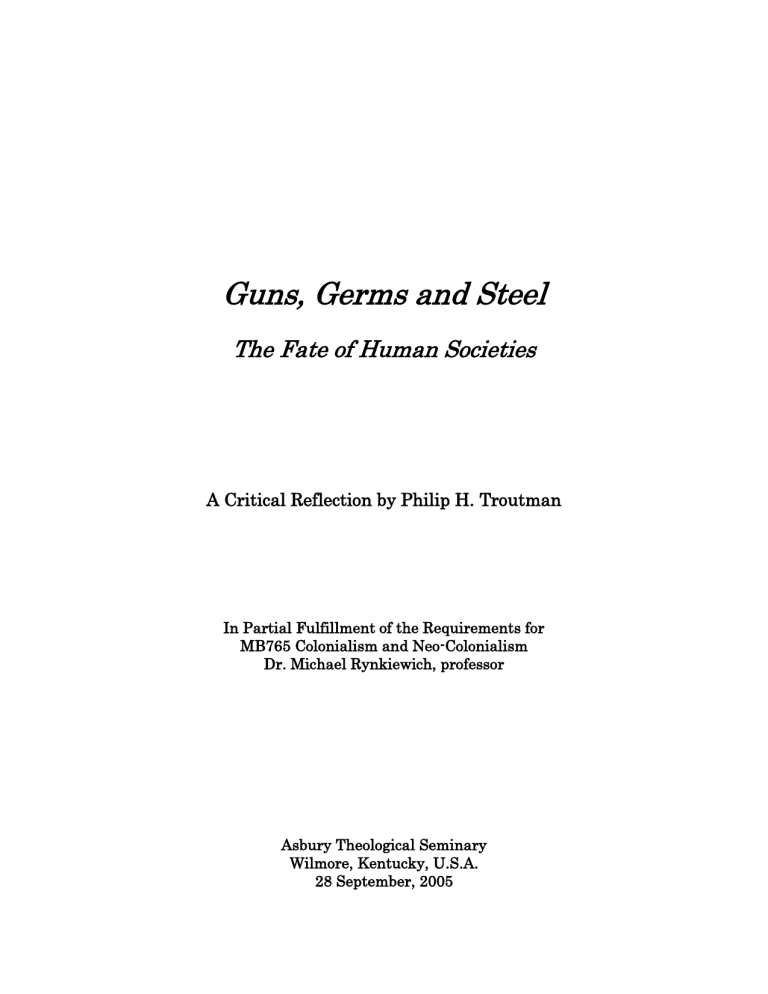
Guns, Germs and Steel The Fate of Human Societies A Critical Reflection by Philip H. Troutman In Partial Fulfillment of the Requirements for MB765 Colonialism and Neo-Colonialism Dr. Michael Rynkiewich, professor Asbury Theological Seminary Wilmore, Kentucky, U.S.A. 28 September, 2005 Guns, Germs and Steel: The Fate of Human Societies A Critical Reflection by Philip H. Troutman Initial Assessment of the book . . . I very much enjoyed reading Diamond’s book. Much of the material was very enlightening, even granted that much of the archaeological evidence he cites can be and has been interpreted somewhat differently by other scholars. But since I am not an archaeologist nor a specialist in human pre-history or history, I am inclined to accept the broad outline of his arguments, even while I reserve my final judgment . Regarding agreement with his basic premise. . . Guns, Germs and Steel offers the most plausible description I have yet encountered of the origins and development of the tremendous disparities which exist between various human societies. I am fully convinced, for instance, that biogeographical and environmental factors have been a major influence on speed of invention and development of human material technology. I was glad to see Diamond debunk the racial superiority theory of the origins of these differences. Critique no. 1 – Is Description an Explanation? It seems to me that Diamond labors under an assumption common to many scientists, namely if one has described a phenomenon, one has therefore explained it and understands it. The reason I suspect him of this assumption lies in the language he uses. He speaks of proximate and ultimate causes . Troutman / Critical Reflection on Diamond, “Guns, Germs and Steel / page 2 Critique no. 2 — Need for a Value Judgment In the Prologue, Diamond seeks to preempt some criticism of his work. He notes that some people object to even discussing the subject of why some nations have dominated others: Perhaps my chief difficulty with Diamond’s work is that he does not address the moral and ethical implications of his theories. His guiding premise is that evolutionary forces, working in the context of the various biogeographical and environmental situations on various continents, are the ultimate cause or explanation for why some societies have dominated others throughout history. The problem is that this theory may too easily be used to justify an apparently logical, but morally and ethically pernicious form of historical determinism. The argument would go as follows: If the conquest of one society by another was merely the natural result of evolutionary and biogeographical processes, then it could plausibly be — since evolution is a natural process—for one society to conquer another, then it is morally and ethically neutral that so many societies have done so. So ultimately, conquest and colonialism is not evil, but simply a result of natural, evolutionary forces. This position has a further unhappy consequence. Most evolutionists tend to equate natural with good. That is, they believe that, overall, evolutionary progress is (almost) always a good thing. This thinking, when carried to the macro level of Troutman / Critical Reflection on Diamond, “Guns, Germs and Steel / page 3 peoples, societies and nations, however, may lead them places that they would not happily go. If evolution is basically good, and survival of the fittest is the basic process of evolution, then: From a human species-wide point of view at least, isn’t it necessarily a good thing that stronger, more “successful” peoples, societies and nations obliterate the less weaker, less “successful” ones? Isn’t this simply the result of natural selection insuring that the strongest and fittest survive? However, if this thinking is carried to its logical conclusion, then it could be (and probably has been) argued that it is ultimately a good thing for humanity that the stronger, more successful nations have subjugated, dominated, colonized, absorbed or obliterated the weaker ones! Need for a value judgment . . . It may well be that the conquest of non-Eurasion nations by Eurasian— primarily European—ones was possible by the natural forces of evolution in conjunction with environmental realities. But responsible historians must not stop with the bare description of the facts. The historical realities must be interpreted, and judged as to their moral and ethical character. And this involves us, inevitably, with human motivation, which is a factor Diamond basically ignores. Or else, he simply attributes the motivation to conquer to the evolutionary principle that species or groups try to flourish at all costs, including by exterminating competing groups. Troutman / Critical Reflection on Diamond, “Guns, Germs and Steel / page 4 As a result, I get the feeling that Diamond’s ultimate conclusion is, “Sorry about that, but that’s just how things are. Due to biogeographical and evolutionary factors, it was inevitable that Eurasia would dominate the world!” The “So What?” Question What does all this mean? What difference does it make? Where do we go from here? What can we do to change things? Should we try? If so, what value system should we/shall we use to determine what to change, and how to change it?
